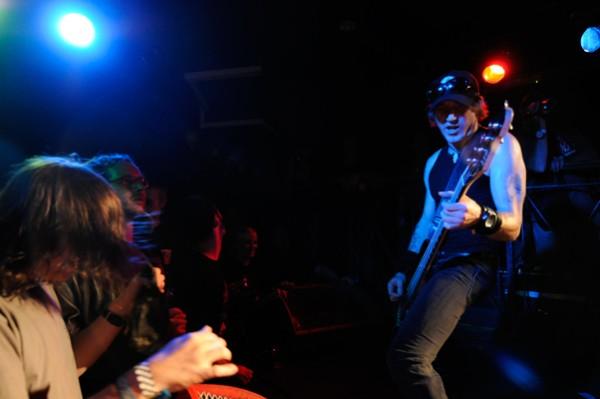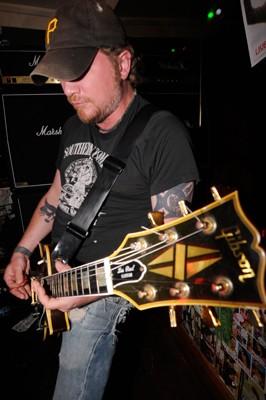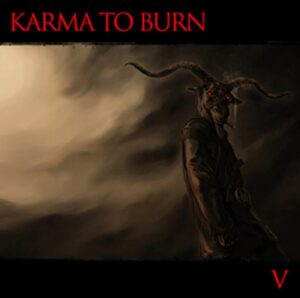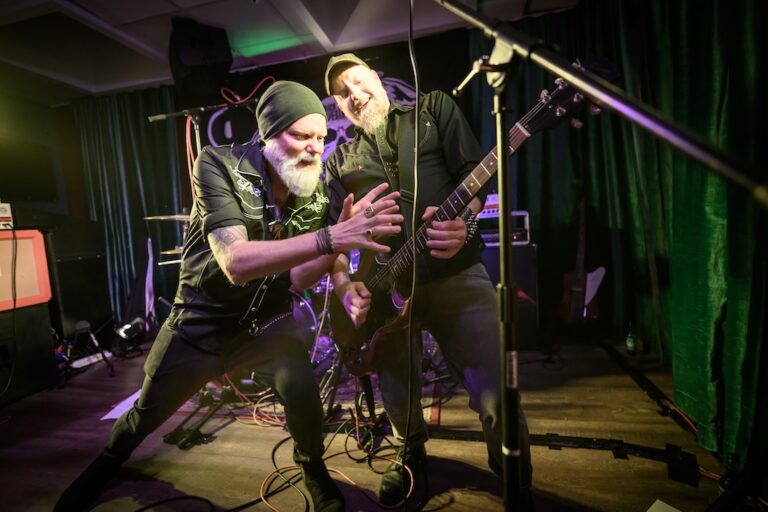When Karma To Burn reformed there were a few stoner fans out there who looked down to see if snow-flakes were pouring out of Hell. Hailing from West Virginia, the band initially appeared to an international audience after signing to Roadrunner in 1996. Unfortunately, Roadrunner failed to understand the band and, after hearing the instrumental self-titled record, insisted vocals be added to the mix. Worse, rather than allow the band to go back and write new material or re-structure existing songs – vocals were simply added to the finished record resulting in an awkward compromise that pleased neither fans nor band. The band responded by firing their singer and promptly got dropped by Roadrunner allowing a greater deal of creative freedom which resulted in the cult releases ‘Wild Wonderful Purgatory’ and ‘Almost Heathen’ (both entirely instrumental as the band had always intended) before dropping off the map in 2002.

Then, in 2009, the near-unthinkable happened and KTB reappeared, touring extensively before releasing the critically acclaimed ‘Appalachian Incantation’ which included a few vocal tracks but which largely stuck to the formulae which had garnered the band fans in the first place. Working with renowned Kyuss member John Garcia didn’t hurt either. Flushed by the success the band promptly went back into the studio and recorded the gloriously dusty ‘V’ which includes not only two original tracks with vocals but also a devastating cover of Sabbath’s ‘Never say die’. We were lucky enough to be granted an interview with founding member Rich Mullins in which he talks freely about the motivation of the band as well as the state of the record industry and the trials of being in a band.
You reappeared back in 2010 – how did you find your reception to be?
I thought it worked out great – it was really a lot of fun and to be honest it was a lot better than what we expected. I mean it was better than when we were around. You know, when we were around before, people would jump up on the stage and sing – now we play instrumentally and people are like “yeah – that’s what they do!”
So what made you decide to kick the whole thing off again?
Well really Will, the guitarist and myself spoke for the first time in seven years and we were basically like “let’s go jam!” which is pretty much how we’ve lived our lives until it’s no longer sustainable – it’s just what we do… so we decided to do it again.

Your first period – when you started off with Roadrunner they made you have vocals and then you went fully instrumental – but when you came back you incorporated vocals back into the mix – what was the inspiration behind that move?
Well at the time we were just being really open minded and we had Daniel and Will at the time, so we just wanted to jam out some songs together and we didn’t know where we were going to use them and then we decided to play them, and we realised they kinda fitted the band so we just decided let’s put them on the record and see what everybody says… ‘Cause I mean originally the very first record should have been all instrumental except for that one song by John and that would have been a pretty good record but it just didn’t happen that way.
My impression of writing instrumental music is that it must be harder because you have to fill that void where vocals would normally be – how do you find it?
I think it’s trickier for us to put in vocals because we have to lay back. We have a lot of ideas as a band and the guitar player starts all the riffs – at a practice and when he starts playing it then we develop the bass part and the drum part and we have loads of ideas and to put in vocals we have to take ideas out of a song otherwise there’s just too much going on sometimes. That’s why we had so much of a problem; because Roadrunner had us record it instrumentally and then they were like “well you have to put vocals over the top of these existing songs…” rather than be like “Ok, go with the singer and write some new songs and then, you know, incorporate these into the record” it was those songs we had to do vocals for so that was kind of the fly in the ointment there.
You released an album last year and that was very well received and you’re back with your new album already which seems like a very quick turnaround – you must be very inspired at the moment?
Yeah, yeah – we just recorded 25 songs over two days for shits and giggles so we’re writing a lot right now and we’re demoing a lot so we’ll see what happens next year too!

What would you consider to be your main inspiration at this point?
We really – we just… We don’t have any one direction that the songs point at – each could be an independent example. I mean I really love Joy division but it doesn’t appear that way in the music except sometimes maybe just a little bit… We really all have different influences pulling at us from Black flag to whatever. So we might use double time here just to see what happens and mostly what we go after are different kinds of grooves – so I’ll try a heavier thing or a groovier thing and then we feel like we should go back in a heavier direction so it’s like that.
You have three songs with vocals on the album – obviously one being a Black Sabbath cover – how do you decide which songs get vocals on? Do you just hear something and think “hey – that needs vocals” or do you deliberately choose tracks to have vocals?
You would think that but it actually just came from living with Daniel and he was like “hey, hey – let me sing on this!” and we thought we’d try it out, listened to it and it turned out OK so that’s really what happened. So like I said, when we approach it that way we have to back off and won’t try to have as many things happening in one riff.
The cover of ‘never say die’ (which is awesome by the way) what was behind the decision to put that on the record?
We really like the lyrics and we like the song a lot and we think that the later Black Sabbath stuff gets so over looked – you know the “technical Ecstasy” and “Never say die” albums don’t get the attention that the other ones do. In fact we’ve played that song sometimes and people think it’s our own song which kind of blows my mind a little. We played it, we played it the other day in Birmingham and people were like “Dude, that song!” and I was “You gotta be kiddin’ me!” Also there’s the fact that the only other cover we did was Joy division and if you look at it lyrically they’re sort of diametrically opposed – one of them is pretty much how everything is completely miserable out there and the other one is the exact opposite and even though at first glance you might think the Black Sabbath song would be darker, it’s not. So it appeals to us to do things that opposed.

Daniel’s left you now, I believe, so are you going to keep the vocals in the songs or are you just not going to play those songs on the new tour?
We’ll do what we always do, which is that we’ll play what we wanna play and if needs be we’ll do it instrumentally; or if Daniel’s there and he wants to sing on them then that’s cool – it all depends on what we feel like doing that night. We don’t feel like we need to put any limits on ourselves.
You guys at the moment seem so fired up – it’s not just KTB but also Year Long Disaster – do you struggle with the workload you’ve taken upon yourself?
No, not really. I mean it’s what we do. I mean I’m always amazed at people who don’t want to work – I mean how many video games are you going to play in one day? That’s what we do and that’s what we want to be doing. And maybe it’s because we had some time off, but I think we’d be doing the same amount if we’d just kept going anyways. We’re just striving to become a better band.
How do you feel you have developed musically over the years?
As soon as we got back together I felt that this should never have really ended because we sort of picked up in a place that we could have advanced to had there not been that time off.
How has the change in the music industry affected you?
[Laughs] I think it’s rough because the people who get hurt the most by what’s happening are the smaller bands – bands like us. Because our crowd knows how to download – they know exactly how to go to Pirate Bay or Demonoid and it’s kind of amazing how many of them will come buy the record anyway because they know that it helps us out. But the smaller bands – like us, we’re the ones who lost. Labels like the Touch And Go label, in the nineties, they’re the kind of bands that aren’t get to go on the road for years at a time to try to work out how to make things better because they have to work jobs so we’re going to lose a lot of musicians who could’ve gotten better – that’s the way I look at it. And we’re just going to get a lot of shitty musician who have a lot of money behind them for one reason or another – be it birthright or success – more powerful labels (which are usually crappier labels) putting money into shittier music so that’s basically what happened. The bands who were creative and really going out there in the nineties – those are those same kids who are out there now and who can’t get funding to do what they want to do.
Yet there are a lot of smaller labels really trying to keep the whole thing going – you know there seems to be a bit of a backlash against this whole I pod generation who put out great editions of albums and support really great bands – I don’t know if you’ve seen anything like that that offers hope?
Not really because there’s so much of it that they all just cancel each other out – you know so much of it and all of it for free if you really look and it’s a basic fact that if you’re not paying for something then there’s just no way to sustain it. And one of the things you see are a lot more Swedish bands than any other country and that’s because they support their artists better there. And when countries support their artists – they’re actually helping their musicians get deals, things like that, you’ll see more bands. In America we’ve wiped out the idea of the small band going on tour – it just isn’t going to happen. I mean it might happen a couple of times but generally not and it is just what it is.
You’re on Napalm records – a very respected label – but you seem to be quite an eclectic choice for them?
The president digs us – that’s all there is to it. He was into it and wanted to do something and so he wanted to get us and he wanted Monster Magnet and he got us both.
You’re on tour in Europe – are there any countries you particularly look forward to coming back to over here?
We love them all – I’ll be honest – you know each one has its own style and it’s… we get a lot of good promoters over here who really work hard to make shows happen and it’s what we don’t see in the States a whole lot. So it’s great over here because there are loads more underground scenes.
…And you’re also doing a couple of the bigger festivals…
Yeah – we always try to do those. It helps us grow. You know when you play to 20,000 people, some of them might get it. Of course someone may also try to jump on stage and sing!
Do you find that your show changes when you headline as opposed to going up to a festival crowd?
No – I mean we can generate just as much energy wherever we play. We’re fairly confident about that – that’s what we work on.
Photos cheerfully pinched from the band’s offical site – if you’re the dude/dudete who took them get in touch and we’ll paste your name all over the article!!!



